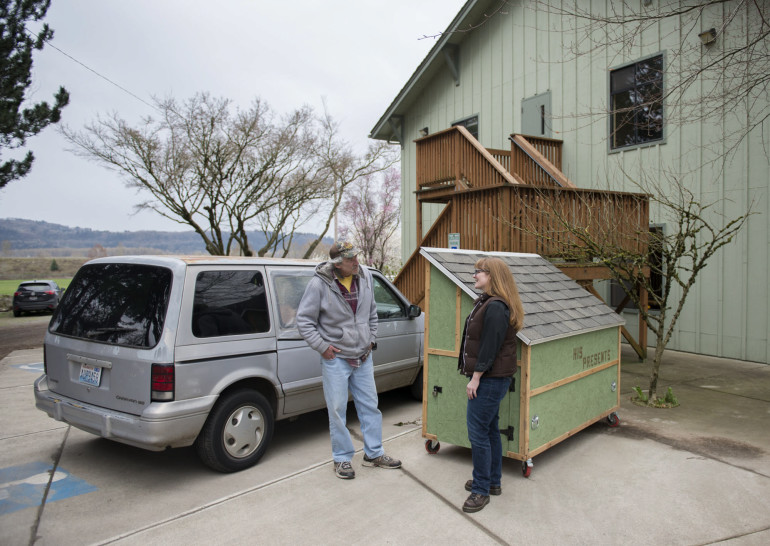The parking lot of St. Anne’s Episcopal in Washougal, Washington, has become a sanctuary of a different sort. The Reverend Jessie Smith, vicar of St. Anne’s, has set in place a program that allows homeless to be able to car camp nights in the church parking lot. Those homeless include Cory Soderberg, interviewed for a story in the The Columbian:
“I’ve been chased out of everything 20 times, and all the cops know me by name,” said Soderberg, who’s been living in his van for nine months.
Now, the 52-year-old sleeps soundly, knowing he won’t be bothered in the parking lot of St. Anne’s Episcopal Church in Washougal. He’s one of nine people staying in cars and small mobile shelters at the church through the Safe Car Camping Program, which is still in its infancy in Clark County. St. Anne’s is the only church in the county allowing people to park vehicles overnight, at least in this formal capacity, though program organizers aim to expand the program to other willing congregations.
The church rents a port-a-potty; some of their overnight residents sleep in their cars, and a few live in “homies” – small shelters built by Washougal resident Rick James, who has created an organization called His Presence to help connect homeless with shelter.
St. Anne’s and others see this kind of program as a temporary solution, a stepping stone for those trying to work their way out of homelessness:
Still, the car-camping program is intended to be a temporary solution to the larger issue of the lack of shelter space and affordable housing in Clark County. Previously, Kravitz and other homeless advocates had rallied around a plan to secure church land where they could build a village of tiny houses. Originally, Safe Harbor Church of the Nazarene in Vancouver offered up its empty field but backed out after threat of a lawsuit. Although Kravitz is still interested in the village, finding appropriate property has been difficult, and the coldest months of winter when it was needed most have come and gone, he said.
St. Luke’s in Vancouver has successfully started its own program, taking on the commitment and the preparation required:
Churches are able to shape the program to their comfort levels, whether that means serving just families, or just single women. Maybe it means not allowing pets or restricting the program to just cars, not RVs or camper trailers. Participants have to sign up, be vetted by calling the Council for the Homeless and abide by a code of conduct…
St. Luke’s Episcopal Church decided not to host cars or RVs. The west Vancouver church allows six people living in four mobile huts to park under a carport on the church’s property. Back in November, when a few people were cited for illegally camping, the church said those people could stay in their parking lot without worry about getting ticketed.
Those living in the huts are able to take advantage of the church’s outreach programs during the week, where volunteers distribute food, bus tickets, clothing and blankets. The occupants have access to electrical outlets, and the church is working on extending the Wi-Fi zone as well, said church member Den Mark Wichar. They all have keyed access to a nearby outhouse. In return for these services, those living in the huts are expected to respect the campus and abide by its general standards (no smoking, no drinking, no fighting).
In Seattle:
The Road to Housing program at Seattle-based Compass Housing Alliance is in its third year, during which time the nonprofit has secured only 12 parking spaces for homeless people living out of their cars, said executive director Janet Pope.
“Churches certainly may be very willing, but it’s a long process,” Pope said. “You’re asking a church to be responsible for what happens on their lot for a good chunk of time, and that’s a big commitment.”
She said that Seattle has had more success converting city-owned parking lots into car-camping spaces. A lot owned by Seattle Public Utilities recently opened and there’s been talk of opening more.
The Reverend Jessie Smith:
“We follow Jesus, who was hospitable to people across every boundary that he could find,” Smith said. “This one small thing we can do to show love across boundaries is to share the gifts that we do have, which is this space, this land, this building.”
Photo from The Columbian

